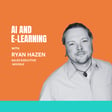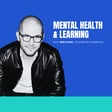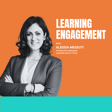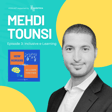Become a Creator today!Start creating today - Share your story with the world!
Start for free
00:00:00
00:00:01

Digital Badges for Human Skills
Discussing how virtual badges recognise and reward personal skills.
Featuring Esther Grieder of Humanitarian Leadership Academy discussing HPass.
Transcript
Diplomas as Home Decor
00:00:00
Speaker
A few months ago, I visited my friend in Washington, DC. As they were giving me the tour of their house, when we were in their home office, he passed a comment as we walked by his university master's diploma, calling it the most expensive decoration in the house. Diplomas look great hanging on a wall, but in a digitally driven world, who will ever see it or recognize it other than being a background in a Zoom call?
Digital Recognition of Humanitarian Skills
00:00:28
Speaker
We're going to explore new digital ways to reward and recognize humanitarian skills and experience in today's episode with Esther Greeter. You're listening to How Humans E-Learn Together, discussing the impact human-connected interactive experiences have on the human capacity to learn.
Impact of E-learning on Learning Capacity
00:00:50
Speaker
This is a podcast for trainers, educators, learning and development professionals, coaches and mentors, the education technology community, and anyone who wants to leverage new ways to reach lifelong learners. And I look at what others in the e-learning industry are doing to make that happen.
00:01:08
Speaker
Today, I'm speaking with Esther. Esther has worked in the national development and humanitarian sector for 20 years, working primarily on education, youth, and humanitarian issues. Over the last six years, she's aligned that with supporting humanitarians through learning initiatives.
Exploring the H Pass Initiative
00:01:25
Speaker
One of them we're going to discuss today is H pass. So I grew up in America and we had Girl Scouts.
00:01:35
Speaker
And so I can't help but like envision, you know, like a Girl Scout vest with like all the different badges on it still, but like with, you know, humanitarian ideas on it. Oh, I know, I know. This is the bane of my life. I mean, the word badge does not suggest something as serious as it ought to, really. So I'm always sad that that is the word that we've kind of hit upon. But I guess I can't sort of change the underlying technology necessarily. And then, yeah, hopefully,
00:02:05
Speaker
people will see beyond that. I mean, it is partially that. It's rewarding people for what they've done, but hopefully they'll also recognize the contribution that it has to make in terms of increasing the transparency of skills in the sector and the transferability between organizations. I think you'll stand a chance as long as you don't start making and selling cookies as well. Esther, can you introduce yourself? Hi, yes. So I'm Esther.
Esther Greeter's Role and HPAS Development
00:02:29
Speaker
I work for Humanitarian Leadership Academy, which is a sub-organization of Save the Children UK.
00:02:35
Speaker
And my role there is that I'm the global communities and partnerships lead. But one of the big pieces of work that I've done, as you say, over the last few years is to develop the HPAS platform. So let's start with that. What are the kinds of skills you seek to recognize with HPAS?
Recognizing Invisible Humanitarian Skills
00:02:50
Speaker
Well, I think one of the key things we set out to do with HPAS was to kind of recognize invisible skills. And way back when we were first conceptualizing HPAS, there were several pieces of research done that were coordinated by an organization called ELRA.
00:03:05
Speaker
which looked at how skills are recognized in the humanitarian sector. And one of the key findings was not so much about kind of lack of skills in the sector, but more about lack of recognition of skills that do exist in the sector. And where there remains a really clear gap is around kind of recognizing the skills of people that are living and working in areas where crises most often happen.
00:03:29
Speaker
So the people that are kind of the first responders to crises. And it's ironic really that those people that are at the very kind of forefront of humanitarian response and are kind of directly saving lives are the ones that are least likely to receive any kind of valuable recognition for those skills that they've used and developed. So that's a key gap in the sector that we had in mind when we were developing.
00:03:49
Speaker
HPUS. And I think it's kind of part of a wider systemic issue in the humanitarian sector really, where global south skills are sort of undervalued in comparison to those in the global north. Yeah, so I guess in answer to your question, that's kind of what we've been set up to do. That's our overarching aim is to recognise a really wide spectrum of skills in the humanitarian sector. So we're looking at those kind of really traditional skills, recognising course completions and assessments and a whole range of kind of technical areas.
00:04:19
Speaker
water and sanitation, monitoring and evaluation, all the things that people need to know from a technical perspective who are working in the sector. But we're also really keen, and I don't think we've cracked it yet, but to look at how we can really recognise practical experience and make those kind of invisible skills visible.
Value of Local Knowledge in Humanitarian Work
00:04:38
Speaker
For anyone who doesn't work in the humanitarian field, could you explain to us why it's important for humanitarians to have
00:04:44
Speaker
qualifications recognised? I suppose in terms of what I was saying about kind of local knowledge, humanitarian response can't happen without that knowledge of the local context, without the people that are there on the ground that understand the kind of key players and the networks and resources that can be mobilised, the kind of cultural considerations that need to be taken into account, language issues and things like that. A humanitarian response can't happen without those people. And it's sort of interesting that we think of humanitarian response as something that's kind of given to
00:05:14
Speaker
communities to help them. It's actually more of a kind of collaborative process whereby the resources of the community are pooled alongside potentially some regional or international resources in order to kind of collaborate on that response. So I think it's really important that those types of skills and knowledge of the local context are recognised. Beyond that, though, I guess there's a wide range of other skills that are definitely really vital to humanitarian response as well.
00:05:43
Speaker
So as I mentioned, kind of technical expertise, things like being able to set up water and sanitation facilities in a refugee camp, you know, things like setting up safe spaces for children or highly technical things like mind clearance. Those are all skills that require some kind of qualification and evidence that you are able to take on those tasks. And I think as well, what we're increasingly finding, which is really interesting, is that there's also a really high value on the kind of interpersonal skills that people bring
00:06:13
Speaker
to their roles in the humanitarian sector as well. And these things are quite difficult to pin down and quantify in a way, you know, and interpersonal skills, sometimes called a soft skill. But those things are also really important, you know, the ability to adapt really fast, kind of changing situations, kind of communicate clearly across cultural boundaries, and to just work as a team and basically do what it takes during an evolving situation.
00:06:37
Speaker
I know from some of my time in the field I've seen different workshops that have been held and usually they've been in the past, they've been in person. They're very thoughtful when it comes to the fact that generally people have other jobs or there's other things going on in their lives to have to
00:06:52
Speaker
to tend to, and the hours will be kind of made around ones that work for the people who are learning these skills.
Shift from In-person to E-learning
00:07:01
Speaker
You know, HPAS works in the digital world. So how has that transitioned from in-person learning to e-learning worked for humanitarians? Yeah, I mean, that's interesting because lots of things, I guess it feels, can only be learned by doing, you know, by having some kind of practical experience. And that's a real problem.
00:07:21
Speaker
in a way for the humanitarian sector because humanitarian responses are really sort of high stakes environment in which to kind of learn and test new approaches. So that's why I think in terms of digital learning, we're seeing kind of a range of different sort of simulations springing up to help
00:07:37
Speaker
people that work in the sector kind of think through different scenarios in advance of actually being in those situations. So examples would be there's one called in 90 days, which kind of puts you in the position of a field manager making decisions and having to kind of juggle the importance of, you know, things like the resources available, your budget, you'll need to kind of be accountable to the populations affected. You need to deliver a specific service, kind of putting you in the position where you have to weigh up
00:08:05
Speaker
all of these many important factors in order to take decisions. And other ones, there's one recently that's come out on Kaya Connect platform called Outbreak Ready as well. And I know that Gametecha also has one called The Flood. So those
00:08:19
Speaker
kinds of simulations are quite an interesting development in recent years. And I think what's also interesting is just that over the past few years, there's been a real movement to kind of make humanitarian learning free and accessible to anyone, anywhere really. And platforms like the Kaya platform are really at the forefront of that. That's the Humanitarian Leadership Academy's learning platform. It's got around 500 different courses on it from different providers. But the aim there is to make it so that anybody can
00:08:46
Speaker
sign up and do a course and do it at their own pace and when they've got time available. From my own personal experience, I know that I've had to do some different qualifications when it comes to working with the United Nations. And I've, to be honest, I've always found it really boring and kind of time consuming and clicking, you know, I'm just clicking to get through the next thing. But, you know, if you found any places or different modules where people doing them together, like connecting people together,
00:09:13
Speaker
Does that make a difference and the impact that it has in the effectiveness of someone completing a course? Yeah, I think that can make a difference.
Role of Social Motivation in Course Completion
00:09:23
Speaker
I mean, one of the things with H Pass that we've seen is that we have this kind of annual, it's not really a competition, but you know, an annual award called H Pass Humanitarian Learner of the Year for the most active learners on the platform. And what we've seen this year that was really interesting
00:09:42
Speaker
was a bunch of different learners starting to kind of challenge each other to complete courses and things like that on LinkedIn. Particularly there was a bunch of learners based in Ethiopia that were all kind of challenging each other to complete courses in order to earn the highest award. And I thought that was quite interesting because obviously it's much as that all the learning is really useful, sitting there and doing it on your own at your laptop can be quite a difficult thing, you know, to motivate yourself in and around a busy
00:10:10
Speaker
So to have that element of kind of like social motivation as well, I think was really helpful for those people. And I found that quite interesting. I'm just imagining like a little Avatar Oscars moment where, you know, the most learned H-pass person is doing their acceptance speech with a little gold statue. Yeah, exactly. I mean, we haven't quite got to that stage yet, but who knows? Maybe that will be the 2023 Awards.
00:10:40
Speaker
Um, I look forward to that and definitely the acceptance speeches. Um, so you've talked a lot about the different courses that are offered. How do you assess the skills that are connected to the courses? Do you mind just sharing a bit about that? In some ways, I guess this is a really.
00:10:57
Speaker
easy question. And in other ways, it's quite difficult. So I suppose we're all familiar with the way that we assess knowledge on, for example, an online course, where you've gained a certain amount of knowledge through the course. And then at the end, there's a bunch of questions and you have to pass mark and you can just evidence that way.
00:11:16
Speaker
you've taken on board the knowledge that you've gained through the course. But I think what's much more difficult is kind of testing whether somebody has gained interpersonal skills or whether they have the relevant practical experience for a role. And I don't think anyone's completely cracked that yet. And it's something that with our HPAS network of organisations, so we've got around
00:11:39
Speaker
over 30 organisations, I think it's 35 now, that issue badges through HPAS. And so within that network, you know, we're talking about different ways to be able to recognise kind of practical experience or kind of interpersonal, softer skills and those things that are quite difficult to measure. So we've got a couple of nice little examples that have come out of there and hopefully there'll be more in the coming years as well.
00:12:05
Speaker
But so one example is we've got a network called the Global Buildings Performance Network. And the aim of their network is to reduce carbon emissions in the buildings industry. So they recognize people that have really championed their cause in terms of literally having achieved a kind of significant policy win in the context in which they're operating. So they recognize kind of people having taken significant action in that way.
00:12:30
Speaker
And then they also recognise people that their network, I guess, deems to be sort of experts in terms of building performance. So that's quite an interesting one where it's the kind of community or the network itself that kind of collectively determines whether somebody has a certain amount of experience or has demonstrated expertise in an area. So it's not just not only one right answer then, in other words.
00:12:57
Speaker
Yeah, exactly. It's not as simple as saying, well, they got the answer right, you can tick it and therefore they've earned a certain level of certification. It's more about being able to recognise those slightly less, they're not less tangible, but less measurable, I suppose.
00:13:15
Speaker
types of achievements, which are often the kind of bigger achievements as well. Which are sometimes the interpersonal skills that some of the H-pass curriculum offers, right? Like to assess things that aren't just knowledge that you have to memorise. Yeah, exactly. And I mean, Sacred Children UK has got an interesting one at the moment where they've just started to try recognising their diversity, equity and inclusion.
00:13:39
Speaker
representatives. So that's people that have really put significant time, I think it's sort of 10% of their working role into championing that cause internally and sort of putting in place systems and processes that promote diversity and inclusion in the workplace. So that's another kind of example of where practice is being recognised. And that's really important. You know, one thing that can always be a deterrent for people is how much time it takes to complete anything in this fast paced
00:14:05
Speaker
life that we can tend to get ourselves caught up in. But so I'm curious, what is the general amount of time or effort required to earn a badge? Yeah, that's a good question. And it varies really widely, actually. I think one of the features of digital badges and of HPAS digital badges as well is that kind of transparency is a really key element. So because it's not like a certificate where it just kind of has the name of the course on the front of it or something like that, you can click through to see the metadata, which tells you exactly what somebody's done.
00:14:34
Speaker
to
Flexibility of Digital Badges for Achievements
00:14:35
Speaker
earn the badge. And in that sense, it makes it a much more kind of flexible medium for recognising all different kinds of achievements, because you can include that detail in there for an employer or somebody to see. So, I mean, we have badges that recognise all sorts of different things really, and it could be something just a one hour course or participation in a webinar or something right up to, you know, almost what I mentioned about having achieved a significant policy win.
00:15:01
Speaker
So it really does vary. I suppose what's quite interesting as well is that lots of our HPS organisations use a kind of pathway approach as well. So, you know, as you say, people feel that their time is at a premium, especially if they're busy doing an important job such as working in the humanitarian sector. One thing that lots of organisations choose to do is to kind of chunk up their learning into very small pieces so that you can almost have that feeling of motivation and achievement as you go through.
00:15:29
Speaker
and as you take on each piece of knowledge. Something that you brought up that I didn't really think about before, but how do you select and choose who your HPAS organizations are? Can anyone just say, hey, I want to...
00:15:41
Speaker
I have a humanitarian organization. I want to create an HPAS for some of the people that are taking different courses or need qualifications with my organization. Can they just apply to you? How does that work? Yeah, so any organization that's delivering learning or some kind of learning experience in the sector can use HPAS badges. We take them through a kind of induction process in order to make sure that the way that they use them is that they
00:16:07
Speaker
in the metadata, they put that kind of really transparent description of exactly what the value of their badge is and what it represents. And we also encourage them to use other ways of kind of attributing value to it, I guess, you know, if you're a kind of little known organization, and you might want to think about who you can collaborate with in order to add value to your badge, kind of a known university in the area that you're working in or something like that, that can also
00:16:33
Speaker
and add its endorsement to the learning that you're doing. So we take through organizations kind of through that process of developing their badges. We also do have this quality standards process. So we have these H-pass quality standards, which there's two sets. So one relates to humanitarian learning and one relates to the assessment of humanitarian competencies. And so these two sets of standards were developed over a two year process. Learning providers in the sector consulted worldwide and online.
00:17:03
Speaker
in order to sort of bring together best practice in terms of how learning and assessment are delivered in the sector. And so we also have those standards and organisations can choose whether to be reviewed against those standards as well to add almost like an extra piece of quality assurance to what they're doing. And are there any costs involved for organisations? Yeah, there are some costs involved in that just because we need to get on board an external review with the relevant expertise.
00:17:31
Speaker
and to be able to take them through that process. And that's partially why we make it optional for our organizations to choose whether to go through that process or not. But for users, is there any cost involved as well? Ah, no, for the learners themselves, the platform is completely free. Yeah, so anybody can go and set up a MyH Plus profile and start to earn badges from different organizations. And is that open to anyone or is it only humanitarians?
00:18:00
Speaker
So absolutely anyone can really start doing some learning if they're interested in in the humanitarian sector. Maybe they're interested in volunteering or they just want to know more about it. They could go onto a platform such as Kaya and look up some different learning and start to earn badges that way. It's interesting as well because you don't lots of people that end up being humanitarians don't necessarily set out to be I guess you know if you think about I suppose in the Ukraine recently that's
00:18:28
Speaker
relatively new humanitarian context. So a lot of people that had other types of jobs in their communities or might have been working in community organisations or businesses have kind of pivoted to be doing work that relates to the response. So often you get people that aren't humanitarian by profession but do need to look up some different skills that they might need to take on as they're responding to an emergency.
00:18:56
Speaker
Absolutely. I've seen that definitely firsthand where just almost any kind of community organization ends up then in a crisis running some leg of services that needs to be filled. The digital world, translating to IRL in real life, are users using their badges in the real world or is it just something that I can mock up on my LinkedIn page and looks good to anyone who might look at my page?
00:19:25
Speaker
Yeah, I mean, hopefully it does look good on your LinkedIn page. I'm sure it does. But I mean, I guess how is it translating from the digital world to the real world? Yeah. Yeah, so they do have real world value. You know, in a way, it's the same as as how a certificate does, except that it has more information in it that the employer can see. And it's kind of it's verifiable as well. So you can trace it back to the organization that issued it.
00:19:50
Speaker
So those are kind of the main differences between a badge and a certificate. There's certainly organizations that are using it as a kind of a prerequisite for you to be working in their organization. So for example, Voluntary Services Overseas, which is a UK based INGO and War Child as well, kind of badge their mandatory training. World Vision has this sort of disaster management foundations badge, which is a kind of prerequisite for being able to join their international surge team. And I know that kind of
00:20:19
Speaker
trainings that everybody needs to have, for example, safeguarding essentials, a lot of organisations make it mandatory for you to have earned that batch in order to be able to work at their organisation or to travel with their organisation or something like that. So there's those kinds of use cases. And then I think more broadly, it's the fact that on a MyH class profile, you can kind of gather together all of the different badges and certifications that you've earned from different organisations and you can have them there in one place and
00:20:48
Speaker
and share that as a link or a QR code or
Effectiveness of Digital Badge Portfolios
00:20:50
Speaker
something like that. And I think there's some element of power in that kind of portfolio as well. So we have some learners that really do spend a lot of time on their learning and development and make sure that they're kind of up to speed on all the latest developments in the sector and earning lots of different badges. And so for them, being able to demonstrate the portfolio as a whole is something really powerful to evidence to their employers, how seriously they're taking their learning and development.
00:21:17
Speaker
Do you think it's also given the opportunity to make the humanitarian sector a bit more equitable when it comes to who can apply for jobs? Because I know that that can be a struggle at times too, as far as, you know, whether someone local or an international posting is posted and what, you know, who's allowed to apply for things. Yeah, I mean, I really hope so. I don't, I don't think we're there yet. But I think down the line, that should be something that HPAS can help to change.
00:21:46
Speaker
I think part of our mandate is to attribute value to all the different kinds of skills and knowledge that are in the sector. And I think there's a tendency towards academic and theoretical knowledge having higher value, anything that's got a degree attached to it compared to that practical experience. I think part of our mandate is to shine more of a spotlight on the practical experience and the everyday steps that people take to advance
00:22:16
Speaker
they're learning, as opposed to those more expensive and time consuming degrees and things. And what's the future for digital badges in the humanitarian sector? Is there something in the pipeline to encourage people to prioritise their learning that you might be able to share with us? Yeah, I think two of the kind of really interesting things hopefully in the future for HPUS are around that kind of ability to recognise different types of
00:22:42
Speaker
learning and expertise. I think we're really lucky in the sector that we've got lots of people that are already very motivated to learn and improve their practice. So part of what I hope we can do is really make sure that those people are being recognized equitably. And then I also think there's a really interesting space for each class to move into and future around kind of mandatory training, which can often be each organization will have its own mandatory training, which is required before you can work in a response with them.
00:23:11
Speaker
And I think there's a role for HPAS to play somewhere in the future, hopefully, about coordinating that more effectively. So making it that if somebody has completed that training with one organisation, that for a certain amount of time that is transferable to any other organisation operating in that area. Because I think that could have a really big impact on kind of efficiency.
00:23:31
Speaker
effectiveness of the sector of rule. And sorry my last question I think I want to add in is are you finding that anyone who's doing badges together are connecting with with other people who are doing badges as well like you know going forward I know you mentioned um the group of people in Ethiopia but I was curious if you have any other buzz um on either the digital world or in the real world about people completing badges together. What we'll be seeking to do as well is is bring together some of those people that have
00:24:02
Speaker
have been really active on the platform and offer them opportunities to kind of share what they've learned across, you know, working in all kinds of different contexts globally. But I think that could be really interesting to kind of extend what we're doing to kind of think as well about what our learners can learn from each other and what they have to share. So I definitely think it will be interesting for
00:24:26
Speaker
H-Pass to be able to put those kind of spaces in place for our learners to get together and share what they're
Further Information on H-Pass and Kaya
00:24:32
Speaker
doing. So if anyone wanted to learn more about H-Pass, Esther, where would they go? Yeah, sure. So you can look us up online at hpass.org or for more information, you can email info at hpass.org. And I also did mention our KIA platform at the Humanitarian Leadership Academy. That's our learning platform.
00:24:54
Speaker
Um, and you can find that at KayaConnect.org. Well, thank you so much for joining me today. And if you'd like to get in touch with us regarding today's episode, or if there's something you'd like to learn on a future episode, send me an email, Lauren at Gamoteca.com. That's all for this episode on how humans e-learn together, supported by Gamoteca. Until next time.









